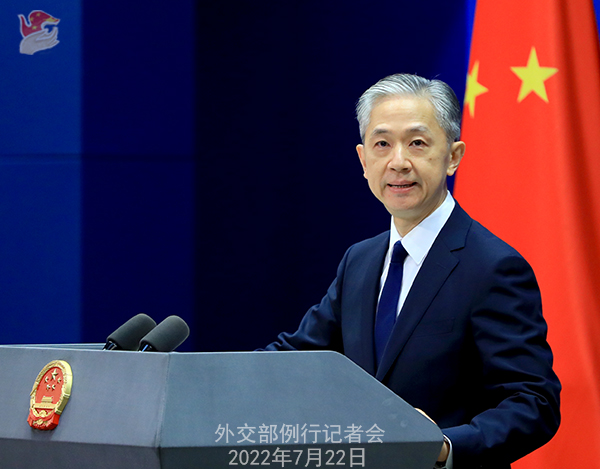
Foreign Ministry spokesman Wang Wenbin. [Photo/fmprc.gov.cn]
Beijing on Friday expressed its firm opposition and has sent stern representations to Tokyo after Japan's new defense white paper contained lengthy paragraphs hyping up the "China threat", as the Japanese government considers amending its pacifist Constitution.
The paper, which was released on Friday and approved by Japanese Prime Minister Fumio Kishida's Cabinet, said the country had "entered a new period of crisis in the twenty-first century", and pointed fingers at China's internal affairs like the Taiwan question, as well as China's military development and cooperation with other countries.
In response, Foreign Ministry spokesman Wang Wenbin said that Japan should "immediately stop the erroneous practice of hyping up security threats in the neighborhood to justify its military build-up".
Noting that Japan publicly stated in the paper that it would revise defense documents by the end of this year and further increase defense spending to develop its so-called counterstrike capabilities, Wang said, "It is worrying that Japan is deviating from the path of pacifist and an exclusively defense-oriented policy".
Following a landslide victory in this month's upper house election, Kishida's administration now has enough seats in both houses of Japan's parliament to push for a revision of the nation's pacifist Constitution.
Under the Constitution, Japan "renounces war as the sovereign right of the nation" and has capped its defense spending at about 1 percent of its GDP for the past 50 years. But since Tokyo changed the status quo unilaterally when it illegally "nationalized" China's Diaoyu Islands in 2012, Japan has become more assertive in terms of security, beginning with lifting the ban on its right to exercise collective self-defense.
As a result, Kishida had vowed to boost its defense budget to 2 percent of the nation's GDP and is considering first-strike capabilities against "enemy bases" in a potential conflict.
However, given that Japan has not fully recovered from the pandemic and a weak yen has made economic burdens on its citizens more pressing, local media said Kishida is expected to face strong resistance on defense spending, primarily from Komeito, the coalition partner of the ruling Liberal Democratic Party.
As a result, Kishida took a step back in recent remarks concerning the 2 percent GDP target and instead used more vague expressions like "drastically increase defense spending within the next five years".
In line with the change, while answering a question from China Daily, a Japanese Defense Ministry official confirmed that "there has not been a clear number set (for the spending) for now".
Wang Qi, a researcher of East Asian Studies at the Chinese Academy of Social Sciences in Beijing, said Tokyo's intention of hyping up the "China threat" serves the purpose of forcing Japan's parliament to approve more spending. "Under this narrative, lawmakers who are against the increase are seen as 'unpatriotic' or at least do not have a sense of crisis."













